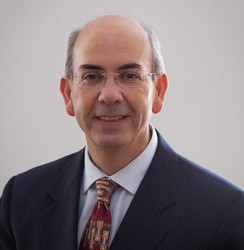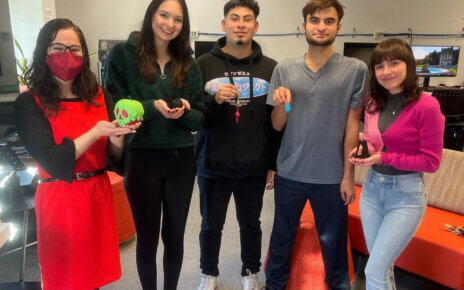Saliba Sarsar Ph.D., Professor of Political Science, had a book published on Jan. 31, 2020 by Peter Lang International Academic Publishers.
Titled Peacebuilding in Israeli-Palestinian Relations, the 164-page book examines the historical relationship between Israelis and Palestinians and focuses on understanding peacebuilding at the individual, pair, and group levels.
The publication recalls many examples of peaceful resolutions and role models such as Dr. Martin Luther King Jr. and Mahatma Gandhi. The objective of the book is for Israelis and Palestinians to learn from and support a grassroots movement for peace.
Sarsar has authored and edited a dozen books and multiple scholarly articles, in addition to more than 80 op-eds. He has given countless public lectures in support of peace, especially as related to Israel and Palestine.
Before graduating with his Ph.D. in political science from Rutgers, Sarsar received a B.A. in political science and history interdisciplinary from Monmouth.
In his newest book, he argues for the necessity of the “Seven Habits of Peace” in order to advance peacebuilding and peacemaking. These include a wider perspective, a long-term view, dialogue, compassion, forgiveness, nonviolence, and reconciliation.
Sarsar said, “There has been much media and scholarly coverage of the resultant violence and of ways to resolve the conflict, especially through top-down peacemaking, but little coverage of ordinary people and groups working together to build peace. It is this fact that motivated me to start researching and writing this book a few years ago. These noble qualities will not happen overnight; peacebuilding takes time and understanding to sustain.”
Hania Sarsar, a graduate student of communication and daughter of Dr. Sarsar, said, I’m so proud of my dad and all the work that he’s accomplished. It’s an important topic not only for students, but for other people to know more about Israeli-Palestinian conflicts. It’s nice to see people like my dad who try to be hopeful and actually take action. I’m excited to see what will come next.”
Dr. Sarsar is also teaching PR 462, “Palestinian-Israeli Relations,” a senior-level, interdisciplinary perspective course. He states that special emphasis, “is placed on the key actors, issues, and events, which are explicated through targeted readings that apply the dual-narrative method and films from the perspectives of both Palestinians and Israelis.”
Nathaniel Gonzo, a senior communication student in Sarsar’s Palestinian-Israeli Relations class, said, “He’s a very intellectual professor. He does a very good job at presenting both sides of the argument. He’s a firm believer of peace in the Middle East.”
One book Sarsar uses in the course is called Side by Side: Parallel Histories of Israel-Palestine. The book is edited by, among others, Palestinian educator Sami Adwan and the late Israeli Jewish social psychologist Dan Bar-On. Interestingly, Sami and Dan served as Fulbright scholars-in-residence at Monmouth thirteen years ago.
A film Sarsar asks his students to watch is “The Lemon Tree,” which was screened on Jan. 28 by MU’s Global Cinema Series. Directed by Eran Riklis and released in 2008, it tells the story of a Palestinian Arab woman’s struggle to keep her lemon grove when Israel’s defense minister acquires a nearby property.
Sarsar remarked on the movie, “The film is symbolic of the relationship between Israel and Palestine. There was an urgent need for dialogue and empathy but instead a huge wall was erected between the two sides.”
The same day as the film screening, President Donald J. Trump announced his “Peace to Prosperity” plan between Israel and Palestine. Scholars and others have criticized the plan as one-sided and a dead end for not involving the Palestinians in its development.
“The hope is that the two nations will understand and learn more about each other,” said Sarsar.
Speaking on her father’s focus for writing, Hania said, “It’s not only a subject. It relates to his family and how he was growing up in Jerusalem. He’s taking that and telling more people about it.” Hania added that her father inspires her to excel not only in the classroom, but also in her leadership position of Station Manager for HawkTV.
During his 35th year teaching at Monmouth, Sarsar not only motivates his daughter who mirrors his hard work and passion, but he also leaves a lasting impact on students.
“He’s a big inspiration,” Hania continued. He’s one of the smartest people I know. I’m really lucky that he’s my dad. He always told me to do something you’re passionate about. Seeing him be so passionate about his work made me want to pursue media production.”
Born and raised in Jerusalem, Dr. Sarsar’s works come to life through biographical features, influencing those who are closest to him.
“I was raised with Middle Eastern influence,” said Hania. “I have to keep my culture. It’s something that’s in me, and I would love to keep that for further generations.”
Hania recalled her father’s experience in the Six-Day War in the Middle East, in which he was separated from his family at the age of 11, which inspired him to gravitate towards writing on Middle Eastern relations.
“He also taught me that education is everything,” said Hania. “People can take everything away from you, but what they can’t take is your degree.”
Reflecting upon the book, Dr. Sarsar said, “My hope is that Israelis and Palestinians in particular and other readers in general, including students, community leaders, and public officials, will understand that there are better ways to resolve conflict than through violence.”
Sarsar concluded, “True peace comes to us when we prepare for it. Our children deserve a better tomorrow than today or yesterday.”
PHOTO COURTESY of Monmouth University




